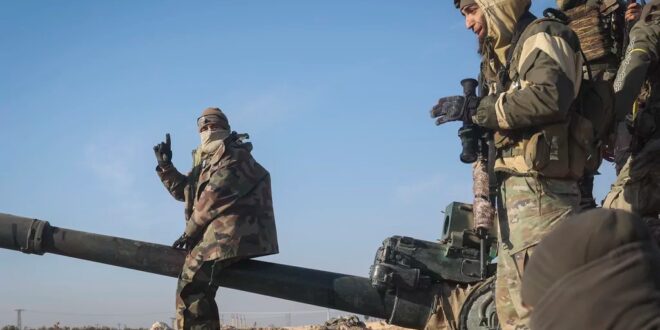The surprise offensive by Jihadist-led rebels into Aleppo reignited the Syrian civil war after four years of relative quiet and put the United States in an unenviable position.
Hayat Tahrir al Sham, recognized as a terrorist group by the United States, and allied militias have continued their offensive, battling the Syrian Arab Army outside Hama. Russia, Iran, and Iran’s proxy militias have rushed to shore up Syrian President Bashar al Assad. The U.S., meanwhile, appears to have been caught flat-footed, distancing itself from the offensive, publicly denouncing both sides, and calling for “de-escalation.”
National Security Advisor Jake Sullivan told CNN on Sunday that HTS is “a terrorist organization designated by the United States. So, we have real concerns about the designs and objectives of that organization.”
“At the same time, of course, we don’t cry over the fact that the Assad government, backed by Russia, Iran, and Hezbollah, are facing certain kinds of pressure,” he added. “So, it’s a complicated situation. It’s one we’re monitoring closely, and we’re staying in close touch with regional partners about it.”
What do the experts say?
In a press call, experts with the Foundation for the Defense of Democracies illustrated the uncomfortable position the U.S. has been put in, unable to root for any side.
“I’ve likened this to the movie Alien vs Predator, FDD Executive Director Jonathan Schanzer said. “We’ve got two essentially bad actors squaring off.”
The U.S. has opponents on both sides, he said, as Assad’s Syria serves as the vital supply conduit for Iran into Lebanon. Large numbers of Hezbollah fighters may be deployed into Syria again.
On the other end, Sunni jihadists dominate the anti-government forces, posing possibly an even greater danger.
“People have been asking whether there’s a good guy. I think that would be too simplistic for what we’re looking at right now,” Schanzer said. “These are actors that support terrorism, that support terror-sponsoring states, that are proxies of terror-sponsoring states, or have non-democratic designs on Syria, to put it mildly. So we’re watching all this with great concern.”
Bill Roggio, editor of FDD’s Long War Journal, said that any support of HTS or the anti-government forces should be unthinkable.
“We need to be very careful about thinking, even remotely thinking about supporting HTS or any of these so-called rebel groups,” he said. “We cannot fall into the trap that we fell into in Afghanistan, to think that they’re moderates. They are not… We certainly wouldn’t treat a group like the KKK here in the United States as suddenly changing its tune and being a moderate organization. And I don’t understand why we treat international jihadists any differently. We give them far more credibility.”
Roggio pointed to the history of the HTS’s leader, Abu Mohammad al-Julani, who fought with jihadist forces against the U.S. in Iraq, then led the Al-Nusra Front, the Al-Qaeda front in Syria. Roggio warned against falling for his public claims of moderation.
“Julani is a very clever individual. He likes to put the suit on and… talk to the press and play the moderate game,” he said, adding that the Taliban did something similar only to retract their pledges.
How might the US get involved?
Roggio also said that the U.S. shouldn’t back the biggest wildcard of the war — the Kurds, who, despite some popularity in the West, aren’t much preferable to the alternatives.
“I know there’s a lot of controversy over this. People will tell you, ‘Well, that’s the PKK branch in Syria, not the PKK branch in Turkey,’” Roggio said, referring to the Kurdistan Workers’ Party, a U.S.-recognized terrorist group. “That’s just an effort to disconnect the dots. The PKK in Turkey is the same as the PKK in Syria is the same as the PKK in Iraq. They basically wear the same flag and take orders from the same leaders.”
“The PKK is … listed as a foreign terrorist organization by the United States. It is responsible for killing tens of thousands of civilians in Turkey. It uses suicide tactics. It’s a Marxist terrorist organization, and it’s backed by the United States,” he added, noting the irony in the U.S. “pick[ing] one” actor to back in the region while calling that same actor a terrorist organization. He also dismissed its rebranding as the Syrian Democratic Forces as “window dressing” as the true force is provided by the PKK.
After warning of the prospect of a resurgent ISIS, Roggio argued that the U.S. should aim to “weaken all these organizations.”
While other experts stressed the view that Assad is detrimental to U.S. interests, Schanzer said that removing him was out of the question for a U.S. administration.
“I think that there’s no way that this administration or the next are going to be interested in removing Assad. We just don’t do regime change anymore,” he said. “In Washington, it’s become something of a dirty word, if you will, since Iraq and Afghanistan, this idea that you know, the devil you know, is going to be better than the chaos that ensues once you begin to try to promote regime change.”
As for how the U.S. will act, Schanzer guessed an attempt to “manage this conflict,” akin to policy toward the Iran-Iraq War. He suggested a “Balkanized Syria” may be the U.S.’s preferred pursuit.
 Eurasia Press & News
Eurasia Press & News




